Factors influencing large-scale demolition in Chile
06 February 2025
Michel Chait, General Manager of Mining at Grupo Flesan, and Emilio Salgado, CEO of Grupo Flesan, discuss the challenges, innovations, and opportunities shaping large-scale demolition in Chile’s mining sector.
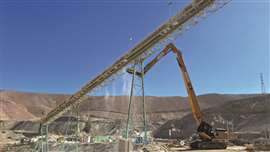 Grupo Flesan is a specialist in mining sector dismanting. Photo: the company’s Quebrada Blanco Mine project in Chile. (PHOTO: Flesan)
Grupo Flesan is a specialist in mining sector dismanting. Photo: the company’s Quebrada Blanco Mine project in Chile. (PHOTO: Flesan)
Chile’s demolition industry is a crucial component of the country’s infrastructure and economic development, particularly in mining—one of its most significant sectors. However, large-scale demolition in Chile faces unique challenges and trends that shape its practices and progress.
Grupo Flesan, a leader in this field, provides valuable insight into these factors through its extensive experience and role as a major player in mining demolitions.
Specialisation in Mining Demolition
Grupo Flesan has established itself as a pioneering company in Chile’s demolition sector, with its international activities hallmarked by its status as a member of both the European Demolition Association and the European Decontamination Institute. With over 43 years of experience, the company has become synonymous with large-scale demolition projects, particularly within the mining industry.
“We are the longest-established demolition company in Chile,” said Michel Chait, General Manager of Grupo Flesan’s mining division. “Our expertise, technology, and ability to handle massive demolitions set us apart. While competitors may offer traditional dismantling services, we focus on complex, large-scale projects.”
This focus on mining demolitions has positioned Grupo Flesan as a critical partner for major mining operators in Chile and beyond. The company’s projects range from decommissioning crushers and stockpiles to demolishing extensive infrastructure at mining sites.
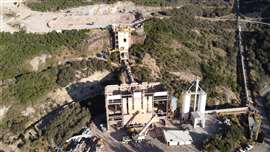 In 2023, Flesan carried out the mechanised demolition of 21 auxiliary infrastructure components at Mina Pierina, in Peru. (PHOTO: Flesan)
In 2023, Flesan carried out the mechanised demolition of 21 auxiliary infrastructure components at Mina Pierina, in Peru. (PHOTO: Flesan)
It is currently undertaking decommissioning work at six mining sites in Chile, as well as significant works at Antamina – one of the largest copper mines in Peru – on behalf of Canadian resource company Teck.
These projects underscore the high level of technical expertise required for mining demolitions, but also highlight the regulatory and environmental hurdles that companies like Grupo Flesan must navigate in Chile’s mining sector.
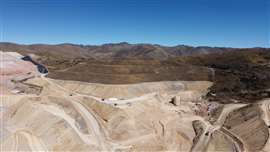 Flesan’s work on the Mina Pierina project saw the company receive recognition for its high level of environment management. (PHOTO: Flesan)
Flesan’s work on the Mina Pierina project saw the company receive recognition for its high level of environment management. (PHOTO: Flesan)
Regulatory and Environmental Challenges
Chile’s demolition sector operates under strict regulatory frameworks, particularly in mining. Environmental compliance and permitting are major hurdles that companies must overcome before starting a project.
“Mining demolition requires specialised knowledge, particularly for tasks like asbestos removal and handling hazardous materials such as acid or gas,” Michel explained.
“For some projects, we spend years securing permits and preparing the groundwork before any physical demolition begins.”
This rigorous permitting process can take several years, as seen in Grupo Flesan’s recent project in Antofagasta, where permits took over four years to secure. The process involves extensive testing, documentation, and adherence to environmental laws, making it a time-intensive aspect of large-scale demolition.
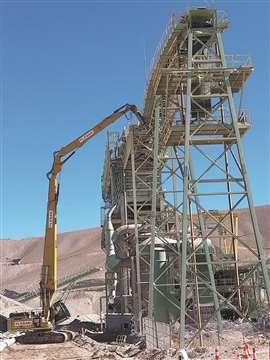 In 2024 Flesan completed the demolition and removal of infrastructure at Teck’s Quebrada Blanco Mine in the Tarapacá Region, Chile. (PHOTO: Flesan)
In 2024 Flesan completed the demolition and removal of infrastructure at Teck’s Quebrada Blanco Mine in the Tarapacá Region, Chile. (PHOTO: Flesan)
Also, the importance of safety and environmental considerations cannot be overstated. Michel noted that Chile’s safety standards are among the highest in the world. “Spanish companies that come to work here often struggle to meet our standards,” he said.
Grupo Flesan’s adherence to these standards has earned it numerous safety awards, including recognition for maintaining six-star safety compliance within Chile’s construction sector.
While the company’s safety standards are high, one of the most pressing challenges for Chile’s demolition industry is the shortage of skilled labour - particularly for specialised roles in mining demolitions.
Labour Shortages and Skill Gaps
“It’s increasingly difficult to find experienced operators for specialised equipment,” Michel admitted.
“We often need to train people in-house. Younger generations are less inclined to take on the demanding conditions of mining work, such as extended shifts in remote locations.”
Michel explained that workers in mining demolition typically operate on shifts of 14 days on-site followed by 14 days off.
“It’s very hard for people, especially younger workers, to leave their homes and families for such long periods,” he said. “Some new workers try it once and never return.”
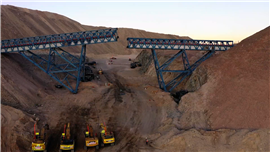 Flesan says the remote location of mining sites is a big barrier to recruitment. Photo: At the Radomiro Tomic site, Flesan’s scope of works includes the dismantling, demolition and transfer of all disused facilities. (PHOTO: Flesan)
Flesan says the remote location of mining sites is a big barrier to recruitment. Photo: At the Radomiro Tomic site, Flesan’s scope of works includes the dismantling, demolition and transfer of all disused facilities. (PHOTO: Flesan)
The physically demanding nature of demolition mining work, compounded by the need to adapt to high altitudes and harsh environmental conditions, further discourages potential workers.
Despite these difficulties, Grupo Flesan remains committed to training and developing its workforce. However, the broader challenge of attracting new talent remains unresolved.
Additionally, the absence of government initiatives to support workforce development in demolition exacerbates the issue.
Michel highlighted the need for early engagement with younger generations to showcase the opportunities within the demolition and mining industries.
“We need to work with schools to tell young people about mining and its potential,” he said. “It’s the main industry in Chile and offers fascinating career paths.”
Competitors in the Demolition Industry
In turn, these workforce challenges are compounded by the competitive landscape within the demolition industry.
The urban demolition sector, in particular, is dominated by smaller companies offering traditional dismantling services.
According to Michel, these firms often lack the technology, expertise, and capacity to handle the large-scale and technically complex projects that Grupo Flesan specialises in.
In the mining sector, competitors include construction companies that provide dismantling as a secondary service, rather than a core focus. “We often compete with firms that rely heavily on manual labour and traditional methods,” Michel said.
“Our ability to deliver faster, safer, and more efficient demolitions using specialised technology gives us a significant edge.” Despite this, the competition helps drive innovation and ensures high standards across the industry.
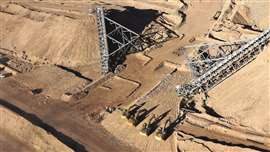 With few dismantling specialists in the region, competition for mining projects often involves competing with construction companies that provide dismantling as a secondary service, rather than a core focus. (PHOTO: Flesan)
With few dismantling specialists in the region, competition for mining projects often involves competing with construction companies that provide dismantling as a secondary service, rather than a core focus. (PHOTO: Flesan)
High Safety Standards
Chile’s demolition and mining industries are characterised by stringent safety standards. These standards are essential for protecting workers and the environment but also significantly impact project timelines and costs.
“The safety standards here are among the highest globally,” Michel stated. “For example, in mining sites, workers often operate in shifts of 14 days on-site and 14 days off, with actual working hours limited by safety requirements.”
The emphasis on safety has shaped the way companies like Grupo Flesan operate.
For instance, the productivity of a 12-hour workday in mining demolition often translates to only six to seven hours of actual work, due to the time required for safety protocols, travel, and other non-productive activities.
While this ensures worker well-being, it also adds layers of complexity to project management. These operational realities must be balanced against the broader economic factors influencing the demolition and mining sectors.
 Michel Chait, General Manager of Grupo Flesan’s mining division. (PHOTO: Flesan)
Michel Chait, General Manager of Grupo Flesan’s mining division. (PHOTO: Flesan)
Economic and Market Dynamics
Chile’s economic growth has slowed in recent years, hovering around 2.3% annually. However, the mining sector remains robust, driven by strong global demand for copper—Chile’s primary export. “Mining continues to invest heavily, even as other construction sectors struggle,” Michel observed.
Emilio Salgado, Grupo Flesan’s CEO, reinforced this point, noting the company’s ability to remain resilient in a challenging economy.
“Our diversification across sectors, including residential construction, bridges, and road maintenance, ensures stability,” Emilio said. “Even when some areas face difficulties, we can rely on mining to drive growth.”
Emilio also expressed concern about global economic dynamics. “Developments in major economies like China or the U.S. can have a significant impact on us,” he explained.
“For example, if China reduces its copper demand, it would affect Chile’s exports. Similarly, restrictive trade policies in the U.S. could pose challenges.”
Looking ahead, Emilio highlighted Grupo Flesan’s plans to expand regionally. “We are developing operations in Peru and looking at opportunities in Colombia and Brazil,” he said.
“Our international clients and mining companies are encouraging us to bring our expertise to new markets.”
These dynamics underscore the necessity of innovation and professionalisation for staying competitive in the evolving industry landscape.
Innovation and Professionalisation
Grupo Flesan says its commitment to innovation and professionalisation sets it apart in the demolition industry. “We invest in new technologies and have a dedicated innovation team,” Michel shared.
These investments not only enhance efficiency but also support the company’s goal of maintaining high safety and environmental standards.
In addition to technological advancements, the company is working to improve inclusivity within its workforce. “We are striving to become a more women-inclusive company,” Michel said, reflecting broader industry trends towards diversity and inclusion.
Grupo Flesan also aims to play a role in raising industry standards by collaborating with smaller demolition firms.
“We work with smaller companies to help them professionalise and meet the standards required for mining projects,” Michel explained.
This collaborative approach not only strengthens the industry but also ensures a broader base of qualified contractors to meet growing demand.
As these partnerships drive progress, they also underscore the challenges and opportunities shaping the industry’s future.
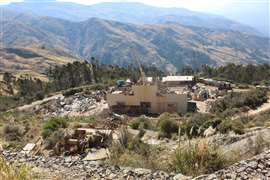 A collaborative approach is needed to strengthen the industry and to ensure a broader base of qualified contractors to meet growing demand for mine dismantling. Photo: Flesan’s Mina Pierina project in Peru. (PHOTO: Flesan)
A collaborative approach is needed to strengthen the industry and to ensure a broader base of qualified contractors to meet growing demand for mine dismantling. Photo: Flesan’s Mina Pierina project in Peru. (PHOTO: Flesan)
The Road Ahead
The factors influencing large-scale demolition in Chile—from stringent regulations and labour shortages to economic dynamics and innovation—paint a complex picture of the industry’s future.
As Grupo Flesan continues to lead the way, its focus on professionalisation, safety, and technological advancement offers a blueprint for overcoming these challenges.
“We’re not just about executing projects,” Michel concluded. “We’re helping to professionalise the industry by collaborating with smaller companies and elevating standards across the board. There’s a lot of potential here, and we’re excited to lead the way.”
CONNECT WITH THE TEAM





